Are you worried about your business operations not running as smoothly as they could?
ERP implementation is the perfect solution for that! ERP is an integrated system of software modules that give you greater control over your business operations. Implementing ERP allows businesses to streamline workflow and reduce operational costs while increasing productivity. This process provides a better understanding of their resources, people, finances, and procedures while improving efficiency and communication.
The path to more innovative operations starts with ERP implementation! ERP processes and services are designed to create greater insight into your production, finance, supply chain, inventory, reporting, and other systems. By automating these processes, you can reduce overhead and increase efficiency.
With an ERP system, customer relationship management and financial tracking are just a few aspects of your business that you can quickly and efficiently control for tremendous success. You can launch more innovative operations for your business. This comprehensive approach offers access to real-time data and insights, integrated processes, and streamlined management.
Through intelligent data sharing, automation, and automation practices, companies using ERP can see almost immediate output capabilities. ERP can significantly improve your efficiency and accuracy, from streamlining record-keeping to automating financials.
With the implementation of ERP, you'll be able to make data-driven decisions quickly and accurately while freeing up time that would otherwise be spent manually updating multiple databases and spreadsheets. Your business will respond more agilely to customer needs without compromising quality and better manage risk through optimized planning.
Whether you're an SMB or a large enterprise, the advantages of an ERP implementation are too significant to ignore. With enhanced productivity, improved decision-making, and greater profits, the benefits of adopting ERP will be worth the effort! Adopting ERP software allows you to streamline operations and get better visibility of your business's daily operations. This will improve your customer service and increase productivity with fewer resources.
You no longer have to struggle with complex IT solutions or waste time assimilating disconnected data. An ERP implementation is the perfect solution—giving you back control of your operations with the tools necessary to succeed in today’s market. Streamlining business processes can significantly reduce costs and increase production times; with an ERP implementation, you get both.

What steps should be taken to ensure a successful implementation of an ERP system?
Implementing an ERP system successfully requires a lot of planning and coordination. Here are the steps you should take to ensure a successful implementation:
1. Clarify your objectives – clearly define what you hope to achieve by implementing the system and how it will help your organization meet its goals.
2. Choose the right system – research different ERP systems and evaluate their features, pricing, and scalability to ensure you select one that meets your needs.
3. Set up process management workflow – establish new processes for managing data, database administration, user access, security, auditing, training, and end-user interface functions before going live.
4. Create an implementation plan – document every step of your implementation process so that everyone knows their responsibilities during each stage of the project execution timeline.
5. Test the system thoroughly – ensure all processes and integrations have been appropriately tested before rolling out the new approach to users to avoid costly mistakes and delays in implementation.
6. Train users effectively– provide adequate training to make them comfortable navigating through their processes within their roles on the integrated platform before they use it daily.
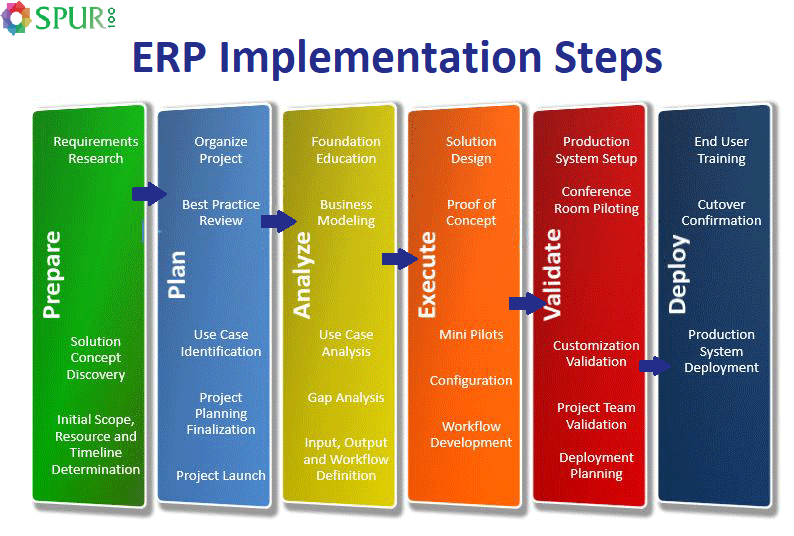
What are the components of an ERP system?
An ERP (Enterprise Resource Planning) system is a software solution for managing the business and automating core processes. It typically includes these components:
1. Accounting module - This allows for managing financial transactions, such as invoicing, accounts payable/receivable, general ledger, budgeting, and more.
2. Manufacturing module - This helps streamline production processes and optimize materials management.
3. Supply chain Management (SCM) - This helps improve stock control and ensure timely delivery of orders while keeping costs down.
4. Human Resources (HR) module allows you to manage employees’ payrolls, vacation leave tracking, training records, performance reviews, job postings, etc.
5. Customer Relationship Management (CRM) - This helps track customer interactions exclusively related to sales functions like order management or marketing campaigns and keep track of buying patterns for a better customer service experience.
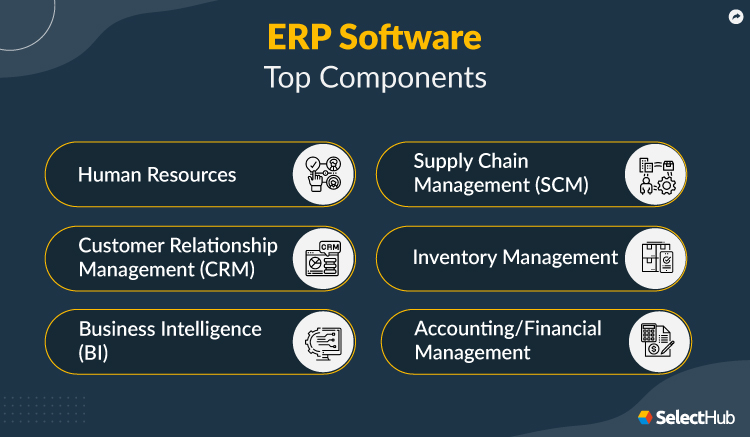
What are the benefits of ERP Implementation?
Implementing an enterprise resource planning (ERP) the system can benefit businesses. These include:

1. Increased efficiency
An Enterprise Resource Planning (ERP) system can help businesses become more efficient and productive. The system streamlines and automates many business processes, such as order processing and inventory management. It also helps increase accuracy by maintaining accurate records of sales, purchases, orders, and financial transactions.
Furthermore, ERP systems allow companies to access real-time business metrics from all areas of the operation, allowing for faster decision-making processes. Automating these processes saves time and money for businesses, ultimately leading to increased productivity and efficiency in all areas of the organization.
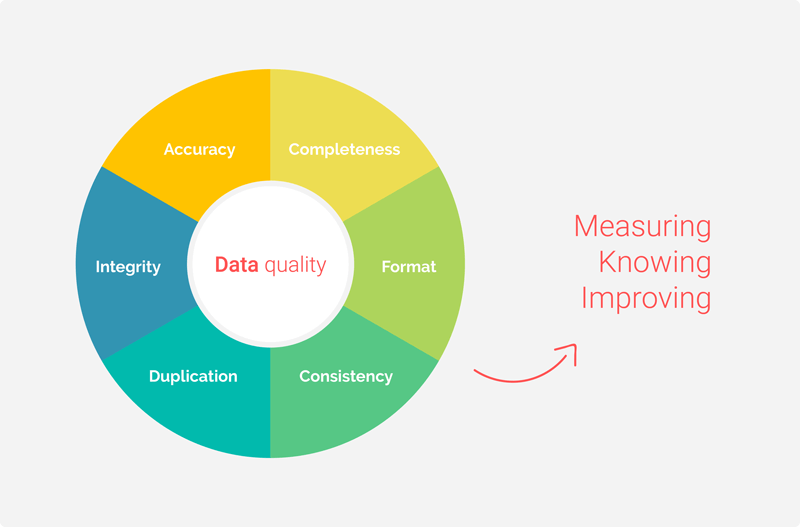
2. Improved data accuracy
ERP systems improve data accuracy and consistency by centralizing all data into one repository. This ensures that the same data is used across various organizational departments and that any changes are quickly reflected. Data stored in the ERP system is easier to access, manipulate, and deploy for the organization’s needs.
Furthermore, it helps to ensure a more accurate understanding of customer behaviors for marketing campaigns, purchase cycles, inventory management, and consumer relations. Additionally, business intelligence tools can be used with an ERP system to improve analytics capabilities extensively and draw out meaningful insights from gathered data.
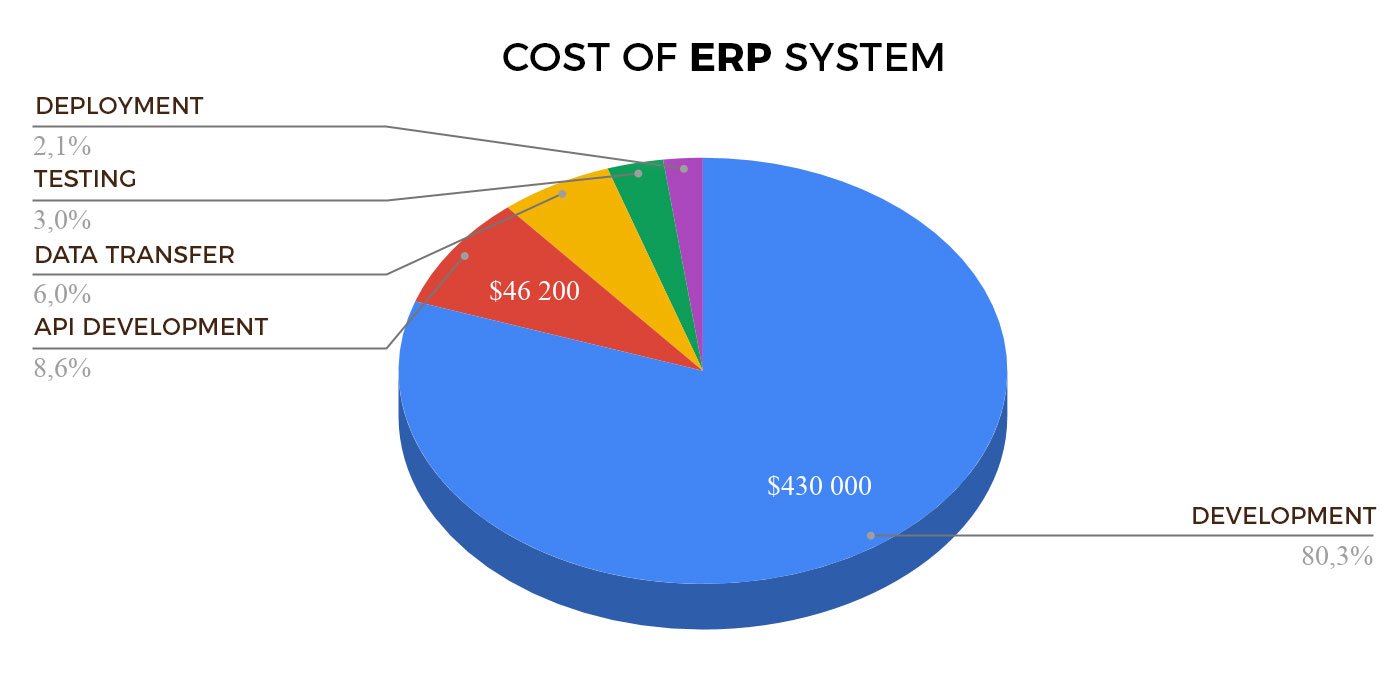
3. Reduced costs
An ERP system helps businesses to streamline their processes and simplify workflows by automating numerous manual techniques such as paperwork, record keeping, task management, and more. This automation reduces the need for manual intervention resulting in increased efficiency and less time required to complete tasks. Additionally, it allows the company to reduce costs associated with manual labor.
An ERP system also increases transparency across the organization which can help identify areas of improvement or expansion, enabling better decision-making. Centralizing data across all departments within an organization allows quick access to critical information while reducing the chance of errors that can be caused due to outdated or inaccurate data. All these features make an ERP system a great choice if you want to reduce costs associated with manual processes and paperwork.

4. Improved customer service
Customers benefit significantly from an ERP system, as it helps them to track their orders and inquire about any issues that may arise quickly. An effective ERP system can provide comprehensive information about the customer's order and offer faster response times to support requests. This increased efficiency adds convenience and reliability to the customer experience, which is especially valuable in a competitive business environment.
Furthermore, the automation capabilities of an ERP system enable the organization to respond more quickly and accurately to customers' inquiries. This allows customers to save time with a reduced need for back-and-forth communications.
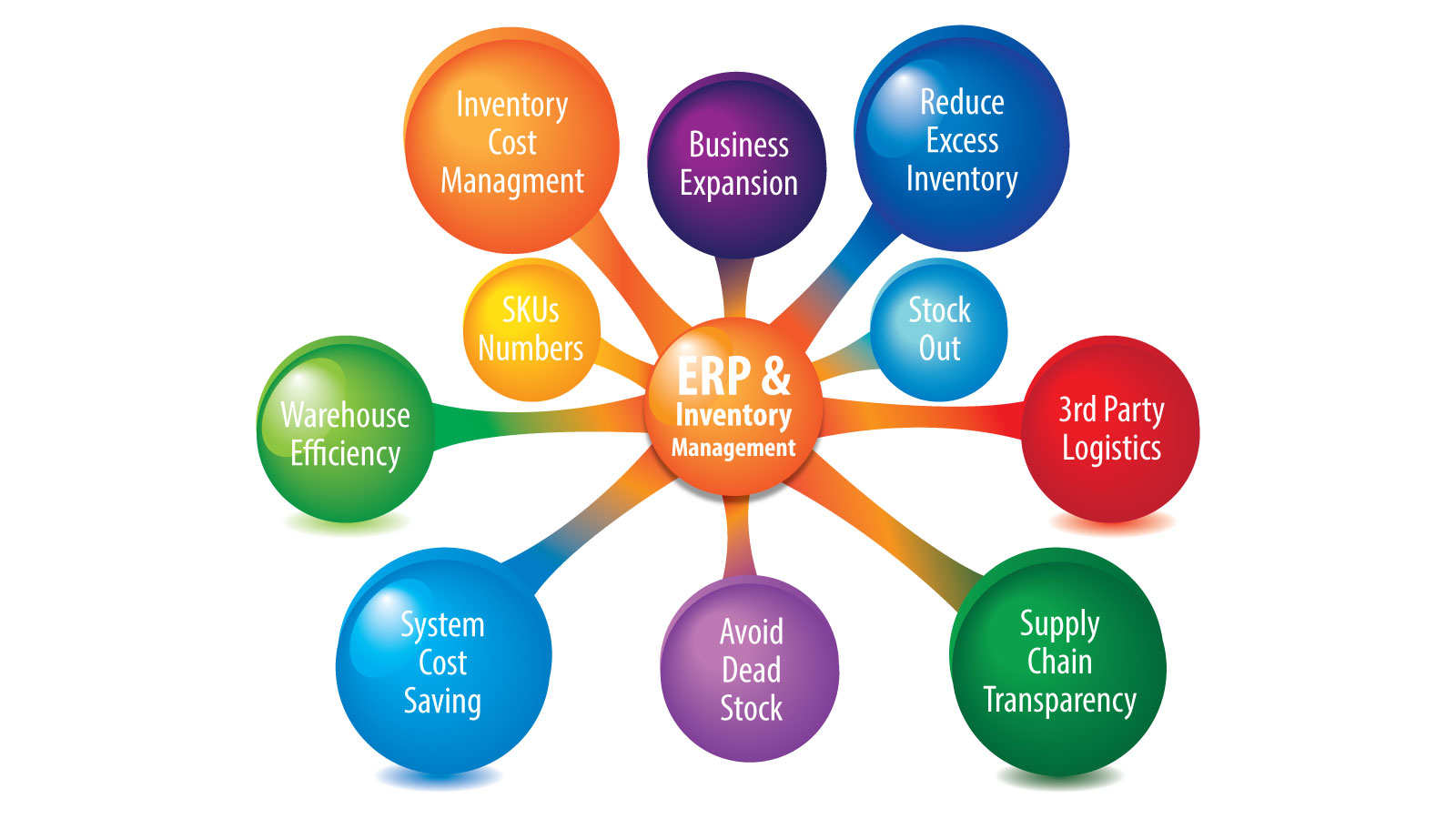
5. Optimized inventory management
An ERP (Enterprise Resource Planning) system provides companies access to real-time inventory data, allowing them to increase productivity and efficiency by streamlining their processes. By accessing this data, companies can better manage their stock levels and order fulfillment times, allowing them to take advantage of the latest opportunities when they appear.
Furthermore, an ERP system enables businesses to proactively detect any problems in stock level or order processing so that they can be addressed quickly to minimize any economic impact. This real-time data also allows senior management to make informed decisions quickly and accurately. As a result, businesses can benefit from enhanced customer service levels and improved profit margins.
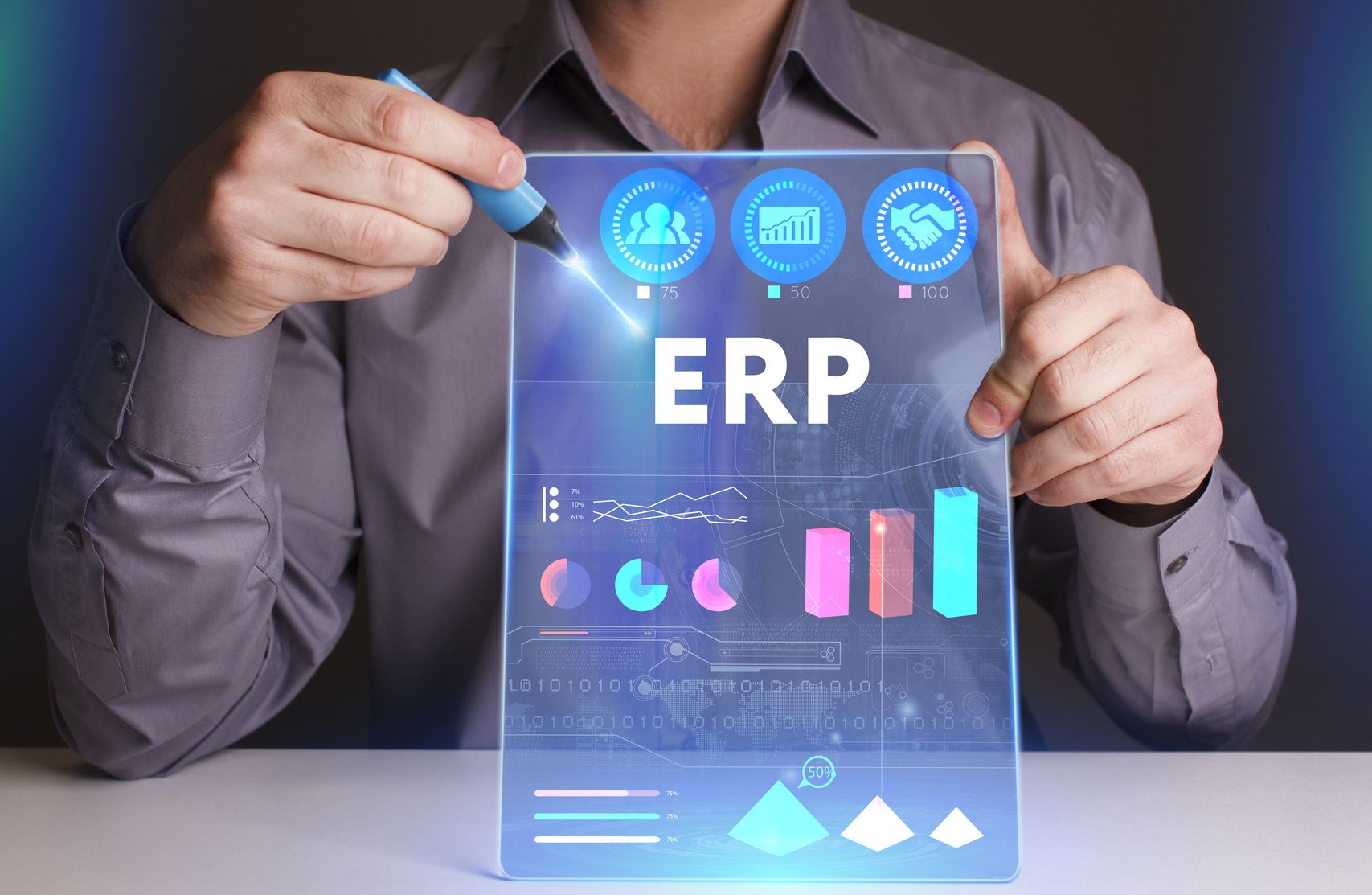
6. Enhanced scalability
An Enterprise Resource Planning (ERP) system helps businesses deal with the complexities of growth without requiring costly and technical solutions. With an ERP system, companies can efficiently manage their customer's needs and demands with accurate data that they can analyze in real-time.
Moreover, they can track business processes and use analytics to identify patterns and predict future trends. An ERP system also makes it easy to compare multiple data sources, so businesses can make informed decisions about how best to scale up operations efficiently. With all the integrated components of an ERP system, it is easier for companies to achieve the desired results while minimizing back-end overhead costs associated with manual administrative tasks.
Implementing an Enterprise Resource Planning (ERP) system can be a decisive advantage for any business, as it streamlines and automates many of the processes you routinely use. Our ERP implementation guide provides clear and practical guidance to help you create an easy-to-follow plan customized to your organization's needs. By reading our guide now, you can start giving more intelligent operations to your business today!















